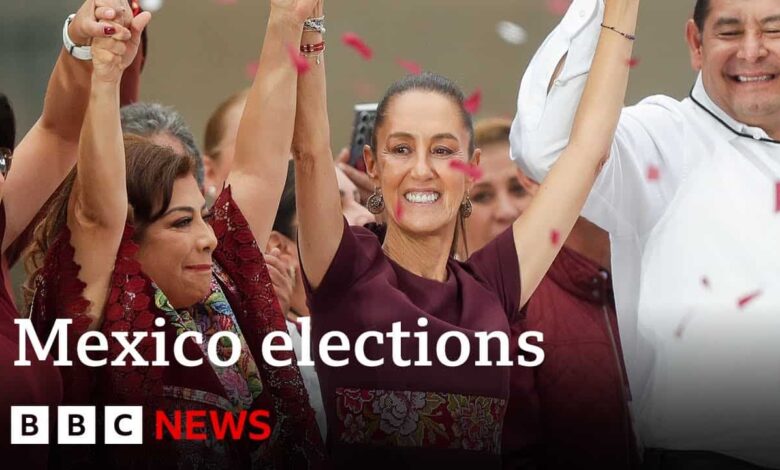
Mexico, a nation famous for its lively culture and rich history, has a complicated and changing political scene. Mexico’s election process is an important feature of its democracy, with many levels of government and a varied range of political parties. This article looks into the complexities of Mexico’s elections, including the electoral system, significant political actors, previous elections, and the issues confronting the democratic process.
The Electoral System
Structure of Government
A federal country, Mexico has 32 states with their own constitutions and governments. The executive, led by the President, the legislative, which includes a bicameral Congress, and the judiciary make up the federal government.
Electoral Authorities
INE, an independent public institution, organizes federal elections. It monitors state and municipal elections for fairness and openness. The Federal Electoral Tribunal (TEPJF) handles electoral disputes and confirms election results.
Voting System
Mexico employs a mixed electoral system that combines elements of proportional representation and first-past-the-post voting. This system is used for elections at both the federal and state levels.
- Presidential Elections: The President of Mexico is elected for a six-year term through a plurality vote. There is no runoff; the candidate with the most votes wins, even if they do not secure an absolute majority.
- Congressional Elections: The Senate consists of 128 members, with 96 elected by plurality in single-member districts and 32 through proportional representation based on a national list. The Chamber of Deputies has 500 members, 300 of whom are elected by plurality in single-member districts, and 200 through proportional representation based on regional lists.
Key Political Players
Major Political Parties
Mexico’s political landscape is dominated by several key parties, each with its own ideology and voter base.
- Institutional Revolutionary Party (PRI): Historically the most powerful party, the PRI ruled Mexico for over 70 years until 2000. It is centrist, with a focus on state-led development and social justice.
- National Action Party (PAN): A center-right party, PAN promotes free-market policies, economic liberalization, and conservative social values. It broke the PRI’s long-held grip on power by winning the presidency in 2000.
- Party of the Democratic Revolution (PRD): A left-wing party that emerged from a split within the PRI, the PRD advocates for social democracy, progressive taxation, and social justice.
- MORENA (National Regeneration Movement): Founded by Andrés Manuel López Obrador, MORENA is a leftist party that promotes anti-corruption measures, social welfare programs, and economic nationalism. It gained prominence with López Obrador’s presidential victory in 2018.
Recent Presidential Elections
The 2018 presidential election changed Mexican politics. AMLO of MORENA won a landslide with nearly 53% of the vote. Countering corruption, inequality, and poverty were his campaign goals. Amid significant anger with corruption and violence, voters rejected the traditional parties in this election.
Congressional Dynamics
Mexico’s political division regularly affects Congress. MORENA and its allies won Senate and Chamber of Deputies majorities in 2018. This majority enabled AMLO’s ambitious reform program but exposed the difficulties of party unity and meeting voters’ different desires.
Challenges Facing the Electoral Process
Electoral Violence
Electoral Violence at the polls is still a big problem in Mexico. Threats of violence and threats are common ways that organized crime groups and local power players try to change the results of elections. There are a lot of risks for candidates and political activists, especially those running for local office. For example, there was a lot of political violence during the 2021 midterm elections, and many politicians and campaign workers were hurt.
Corruption and Accountability
Corruption is a big problem in Mexican politics, and people don’t trust the election process. Efforts to fight graft, like AMLO’s anti-corruption programs, are very important but have had mixed results. Making sure that campaign finance and government operations are open and accountable will stay a top concern.
Voter Participation and Disenfranchisement
Even though a lot of people usually vote in federal elections, there are worries about people losing their right to vote and not caring about voting. Some things, like differences in income, not having enough schooling, and not trusting the government, can keep people from voting. For a democracy to work, people need to be more likely to vote, especially people from underrepresented groups.
Media and Information
More and more, the media and knowledge play a big part in voting. The spread of false information and fake news can change how voters think and what happens in elections. For elections to be fair, there needs to be a free and fair media atmosphere and steps need to be taken to fight lies.
The Role of Civil Society and International Observers
Civil Society Organizations
Civil society groups are very important for making sure that elections in Mexico are free and fair. These groups work to educate voters, keep an eye on elections, and push for changes to the way elections work. In addition, they help make sure that elections are fair and that people know what their rights and duties are as voters.
International Observers
International monitors, such as those from the European Union (EU) and the Organization of American States (OAS), have been watching the Mexican polls to see how fair and open they were. Their appearance helps keep election scams from happening and gives fair reviews of the voting process.
Recent Electoral Reforms
Mexico has made a number of changes to its elections that are meant to make them more fair and effective. Some of these changes are steps to make campaign finance more open, give election officials more freedom, and make sure that voter rolls are correct. Reforms need to keep going in order to deal with new problems and make political institutions stronger.
Conclusion
Mexico’s election process shows how committed the country is to democracy, even though it faces many problems. The Mexican elections are complicated and always changing. The big political parties play a big part, and violence and corruption can have a big effect on the results. To keep the political process honest, the work of civil society, election officials, and foreign monitors is very important. As Mexico’s politics change, it will be important for the country’s democracy to deal with the problems in its voting system and build on its strengths.
Without a question, the 2024 presidential race will be another important turning point in Mexico’s political history. The country is at a crossroads, and the result of this election will have a huge impact on the people who live there and on the political scene. For Mexico to stay a strong and active democracy, continuing work to improve election security and support fair and free elections is very important.

Hey there! I’m Dyna, the author of Baddiehub.lol. For 9 years, I’ve been in the tech world, focusing on the latest technological growth in our daily tech life. My mission? Provide clear guides on everything from streaming devices to card activations. I’m all about guiding you step-by-step through any process. With my guides, you’re always on the right path.





